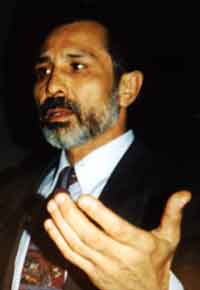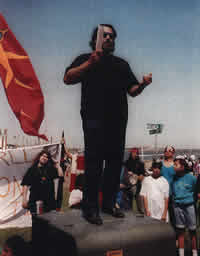 Who is Xinachtli (slave name: Alvaro Luna Hernandez)?
Who is Xinachtli (slave name: Alvaro Luna Hernandez)?
Xinachtli was sentenced in Odessa, TX on June 2-9, 1997 to 50 years in prison for defending himself by disarming a police officer drawing a weapon on him (unarmed). The trial evidence clearly showed Xinachtli was the victim of “witchhunts” and a police-orchestrated conspiracy to frame or eliminate him.
History of A Longtime Freedom Fighter
Police informants were used to monitor Xinachtli’s organizing activities in the barrio. They were told Xinachtli was “typing legal papers,” “had many books” and was working on police brutality cases in Alpine.
The police knew of Xinachtli’s history of community-based organizing and his legal skills. Xinachtli was recognized nationally and internationally as the national coordiantor of the Ricardo Aldape Guerra Defense Committee, which led the struggle to free Mexican national Aldape Guerra from Texas’ death row after being framed by Houston police for allegedly killing a cop. Xinachtli’s human rights work was recognized in Italy, France, Spain, Switzerland, Mexico and other countries.
Facts about Xinachtli:
- Xinachtli was recognized nationally and internationally as the national coordinator of the Ricardo Aldape Guerra Defense Committee, which led the struggle to free Mexican national Aldape Guerra from Texas’ death row after being framed by Houston police for allegedly killing a cop. Xinachtli’s human rights work was recognized in Italy, France, Spain, Switzerland, Mexico and other countries.
- Xinachtli spearheaded the National Movement of La Raza, Stop the Violence Youth Committee and the Prisoners Solidarity Committee in Houston, Texas (USA), where he is known as a symbol of resistance to injustice.
- Xinachtli was sent to prison (narrowly dodging the death penalty) in 1976 for a murder he did not commit, a fact that was exposed by various media outlets and led to his eventual release. “What I learned about the prosecutorial behavior in the trial of Alvaro Hernandez in West Texas made my stomach turn,” wrote columnist Paul Harasim. “Coming in the wake of Randall Dale Adams and Clarence Brandley — new evidence surfaced to get them off and out of prison — I wonder if I can support state sanctioned executions any longer.” [Source: Houston Post, 8 April 1991]
- From his previous case, Xinachtli’s struggle, along with hundreds of other cases of political imprisonment, was adopted on Dec. 9, 1990 at Hunter College in New York City by the Special International Tribunal on violations of human rights of political prisoners and prisoners of war held in U.S. prisons and jails.
- In March 1993, Xinachtli was a non-governmental organization (NGO) delegate before the 49th session of the United Nations Commission on Human Rights in Geneva, Switzerland. Before the U.N. General Assembly, he vociferously exposed and condemned the U.S. government’s dismal human rights record and its human rights violations of U.S. political prisoners.
- Xinachtli was a public speaker invited to speak at many colleges, universities and conferences in this country. His topics ranged from from injustices of the criminal justice system against people of color, to self-determination, human rights, political prisoners, Aztlán, national liberation and revolution. His eloquent, dynamic presentations would electrify audiences.
- On July 18, 1996, Sheriff Jack McDaniel of Alpine, Texas, went to arrest Xinachtli at his home on a charge of aggravated robbery (later dismissed with Xinachtli as his own counsel). No warrant for the arrest was issued. When the unarmed Xinachtli questioned the sheriff’s action, the cop drew his weapon. Before he could shoot, Xinachtli disarmed him and fled. Xinachtli did not inflict any injury on the officer and, as several people conceded, Xinachtli could have further harmed the sheriff and did not, as such was not his intention. Xinachtli was in fear for his life.
- At Xinachtli’s trial, police described Xinachtli as a “troublemaker.” Other officers indicated that there was concern Xinachtli was collecting information about police brutality in the barrios, as well as pursuing a potential suit against law enforcement over the killing of Mexicano youth Ervay Ramos when Xinachtli was a youth.
- Xinachtli was no stranger to the police. He had previously won civil rights suits against the Pecos County Sheriff’s Department and county for a brutal beating he endured at the hands of police years ago. Two deputy sheriffs were convicted for the criminal civil rights violations stemming from the beating. The police received five years probation and never spent a day in jail.
- On June 2-9, 1997, Xinachtli was convicted of “threatening” the sheriff, but acquitted on the charge of shooting Sgt. Hines. He received a 50-year sentence.
 What You Can Do
What You Can Do
The political trial of long-time Chicano Mexicano (“Latino”/indigenous people of the southwest U.S.) activist Xinachtli is another example of this government’s plot to discredit, falsely imprison or kill freedom fighters of liberation movements of oppressed internal colonies battling to free themselves from the yoke of U.S. imperialism.
By “criminalizing” these movements for political self-determination, the government denies their existence, the existence of political prisoners and the class contradictions in this society. As the world joined hands to expose the racist regime of South Africa, and won the freedom of Nelson Mandela, we must expose the U.S. government’s lie that it holds no political prisoners of war in its prisons.
Xinachtli deserves the support of all honest progressive freedom forces in the United States and throughout the world. While his case if on appeal, al legal defense fund has been established to solicit funds for appeal costs and organizing materials, including a book, Xinachtli’s writings and recordings.

